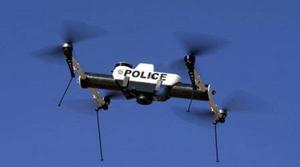DronesBipartisan consensus on drone legislation emerges in Congress
More and more law enforcement departments across the country have purchased, or are considering purchasing, drones. Some states have already passed laws to regulate the use of drones. Congress, in an effort to prevent the emergence of a patchwork of regulations which differ from state to state, is considering passing drone legislation.

Congress to write rules concerning police use of drones // Source: dsjjns.com
More and more law enforcement departments across the country have purchased, or are considering purchasing, drones, and Congress wants to have a say on the issue.
The Washington Times reports thatlawmakers from both parties want to draft drone legislation before the issue gets out of hand and is settled in smaller courts across the country. “Congress, in the area of drones, needs to set the standards rather than let the courts, down the road, set the standards,” Representative Ted Poe (R-Texas), who authored of one of several pieces of drone privacy legislation, told the Times.
Representative John Conyers (D-Michigan) believes that drones could have such an impact, that the Fourth Amendment which protects Americans against unreasonable searches and seizures will not offer enough protection.
“This is a prime example of technology overtaking established law, and I think we’re going to have to go beyond the Fourth Amendment,” Conyers told a House Judiciary Subcommittee on Crime, Terrorism, and Homeland Security Investigations.
“There are going to have to be a body of statutes that go into some of this in detail,” Conyers added.
Unmanned vehicles, on the ground, in the air, and at sea are currently used on a large scale only by the military. A few local and state law enforcement agencies use them as well, but many states and cities are looking to use them, and the technology is expected to proliferate in the future.
Laws already exist to preventing spying in someone’s window, but privacy advocates say they still more needs to be done because the laws of today may not keep up with the technology of tomorrow.
“Because of the technology now available, comparing a drone to a traditional aircraft such as a plane or helicopter is like comparing a frisk from a police officer to a modern X-ray machine,” Tracey Maclin, a professor at Boston University’s School of Law, told the subcommittee.
Virginia, Idaho, Florida, and other states have put limitations on how and when drones can be used, by citizens and law enforcement, but states regulating drone use by themselves is leading to a situation in which different laws apply in different states.
Lawmakers in Congress want there to be a least a baseline of rules everyone can follow, and, for now at least, it appears that both parties are in agreement in the need for drone legislation.
“I think there’s a lot of room for agreement on both sides … I think we agree on a great deal on this area,” Representative Louie Gohmert (R-Texas) told the Times.
